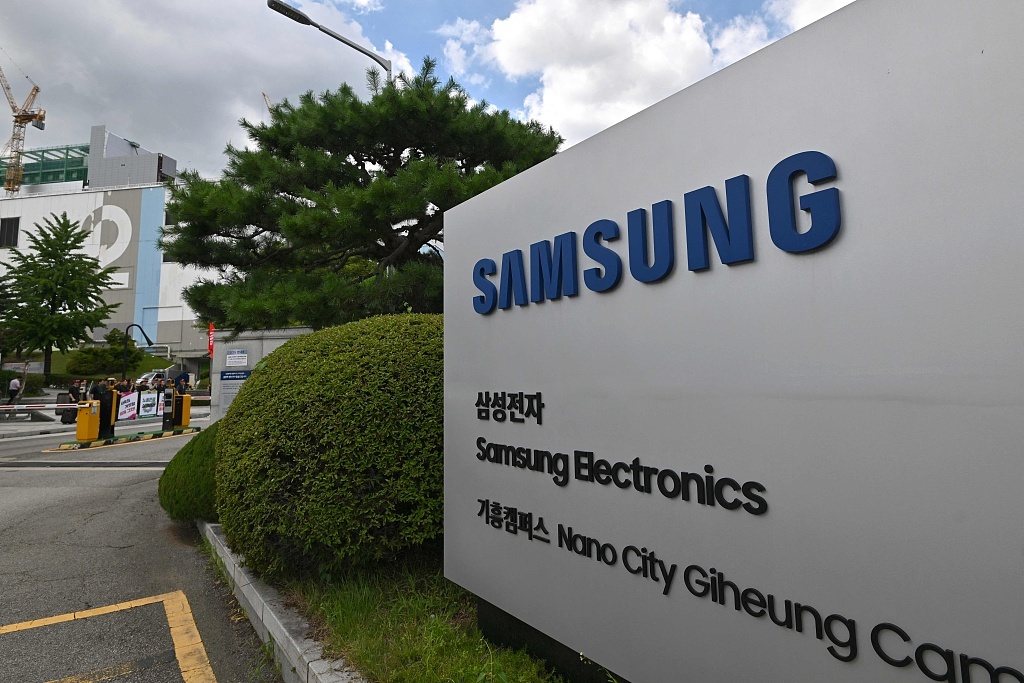After a three-day strike failed to resolve demands, South Korea’s national Samsung Electronics Union announced on its website on July 10 that it would go on strike indefinitely, according to the Yonhap news agency. Although Samsung said its production lines were operating normally, there was widespread speculation that production and delivery would not be guaranteed if the strike continued, and that the impact would spread up and down the chain and into the technology industry.

Local time 2024 a sign outside Samsung Electronics’ Kihing Park in Yongin, South Korea, on July 10.
Whether or not it has affected production
The Union has about 30,000 members, accounting for nearly a quarter of Samsung Electronics’ workforce in South Korea, Reuters reported Tuesday. “The company management has no intention of entering into dialogue after the first general strike, so a second general strike will commence on July 10 and continue indefinitely,” the Union said, in an unprecedented move in the company’s 55-year history.
The union had asked for an extra day of holiday to mark the union’s establishment, a 3.5% pay rise for all union members, improvements to the bonus system and compensation for economic losses caused by the strike. According to reports, Gyeonggi, P’y?ngt’AEK ? Pyeongtaek, Ten’an, Wen Yang, Kumi ? Gumi, Huangchuan County and other South Korean Samsung Electronics Union members from all over the country attended the event. More than 5,000 employees from the semiconductor equipment, manufacturing and development departments took part in the strike.
Samsung Electronics is the world’s largest maker of memory chips, smartphones and televisions. Samsung’s share price fell after the union’s action yesterday. The stock fell after four consecutive sessions of gains and was down 0.3 per cent in the afternoon.
Lee Hyeonwuk, the union’s vice president, told Reuters the strike had slowed operations on some of the chip production lines. “It has nothing to do with Semiconductor fabrication plant automation and production will inevitably go wrong without equipment, inspection and other personnel,” the Union said, although Samsung denied that the strike had affected production. The truth could be somewhere in between, with Reuters citing unnamed analysts as saying it would be difficult to verify the disruption without further details of the processes affected by the union’s actions.
20 days is the limit?
South Korea’s Chosun Ilbo reported that, “If the strike is long-term, market share will be squeezed by domestic rivals such as TSMC and SK Hynix,” said Huang Yongzhi, a professor of Business at Sejong the Great University. “Performance will decline and bonuses will naturally fall. There will only be a vicious circle.”, samsung is grappling with competition from semiconductors used in AI applications in an effort to persuade big customers such as Nvidia to use its HBM memory chip to take a bigger share of the AI market. But any disruption could affect its chances of overtaking rival SK Hynix as Nvidia’s preferred supplier of memory chips.
South Korea also faces stiff competition from foreign companies, the report said. “It’s hard to attract customers because of the loss of trust. Amid fierce semiconductor competition around the world, including in the US, Japan, Europe and China’s Taiwan, there are concerns that the union strike could undermine South Korea’s semiconductor competitiveness. “Countries around the world are fighting for semiconductor dominance,” said one industry source
The Woes of Samsung’s management are deepening. Although Samsung officially said that“There are no production problems”, but if the strike time prolonged, alternative manpower input will be limited. Moreover, the nature of the Semiconductor industry requires factories to operate 24 hours a day, union leader Sun Yumu told CNN on Monday, CNN “It will take a long time to resume the facilities that have been closed because of the strike,” said one Samsung insider, adding that if the strike lasts more than 20 days, extreme conditions could emerge.
Will it spread around the world
“Samsung Union strikes may affect global memory chip supply,” Forbes said Monday, the move could disrupt production of the company’s advanced memory chips for artificial intelligence accelerators, computers and smartphones. Samsung is the world’s largest maker of memory chips, which have been the main driver of its profits in the artificial intelligence boom.
Samsung has a 45.5 percent share of the global DRAM chip market and a 36.6 percent share of the NAND flash chip market, both important components of computers, smartphones and servers, according to Trendforce, a research firm.
The Chosun Ilbo said that on the 8-inch wafer assembly line, which the Union said had stopped working, the main products are in-car chips and display drive chips. If the strike is prolonged, the auto industry may have a second car semiconductor“Mess.”. Any disruption to Samsung’s operations could have a knock-on effect, industry sources said. A shortage of key components will not only affect the production of consumer electronics, but could also spill over into enterprise markets such as cloud computing and data storage.
The strike also coincided with Samsung’s global launch event in Paris, where it unveiled a foldable phone with artificial intelligence and a new health-tracking watch to compete with Apple.
The telecoms industry’s“Telecoms” website notes that the strike may not yet pose a significant threat to Samsung’s business, but it is certainly not good news for the company. The company’s chip-making may not have been disrupted, but the potential impact of the strike remains in doubt for now.